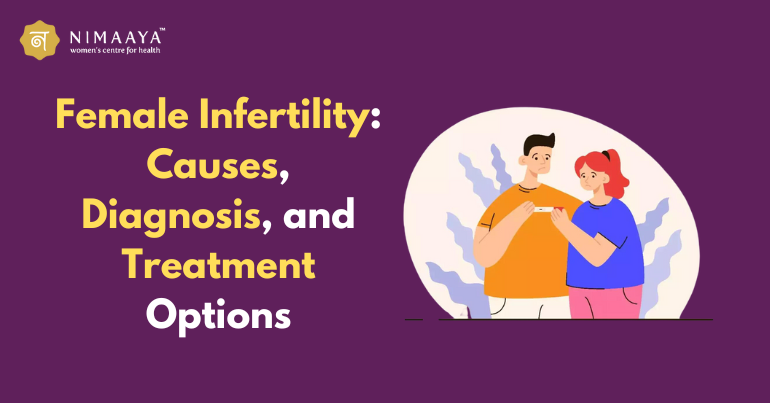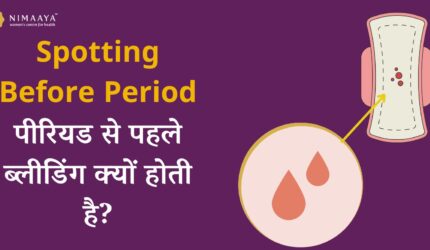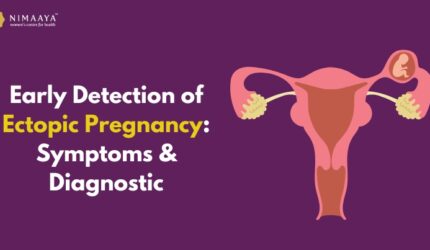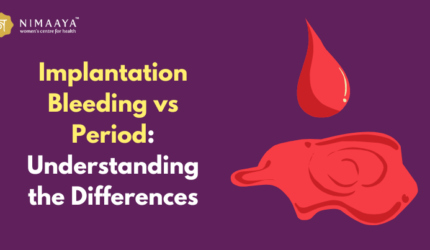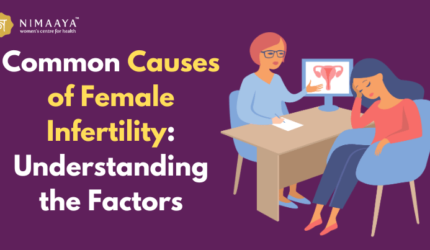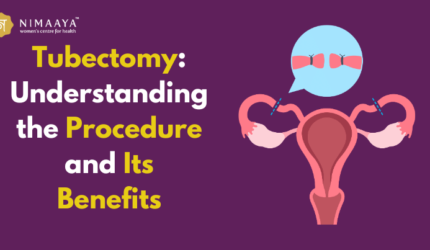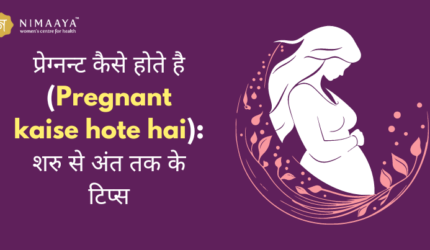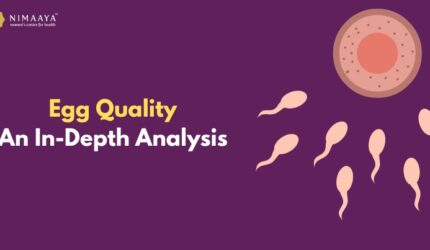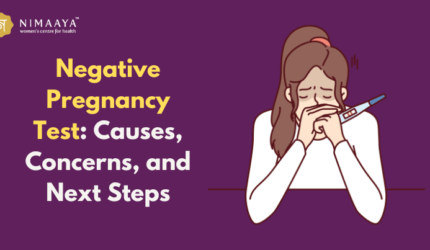According to the WHO, one in every four couples in developing countries is affected by infertility. While this issue was not addressed in India, efforts have been initiated to address it through seminars, sessions, consultations, and more.
To detect female infertility symptoms, IVF specialist centers conduct a diagnostic test for female infertility. These tests will not only tell you the reasons behind infertility but also conduct consultation on which individuals should choose infertility treatment to get pregnant successfully.
At Nimaaya IVF Center, we encounter different types of infertility in females every day. We
make sure to provide infertility solutions using top-notch equipment installed at our premises.
In this blog, we will delve into the concept of female infertility, its causes, diagnosis, and available treatment options to address the issue.
What is Female Infertility?
Female infertility can be defined as the inability to get pregnant. The problem is diagnosed when a woman is attempting to conceive a baby for 1 year and can’t be successful.
To overcome this, there are numerous treatment options available, including IVF, IUI, ICSI, and much more, which help couples successfully conceive a baby.
It is important to note that the problem of conceiving a baby may not solely be attributed to female factors. Male infertility issues can also contribute to the problem.
You might wonder when to consult a fertility specialist. This decision depends on factors such as:
If you are 35+ and trying and trying to get pregnant for 6 months or more without any protection, you should consult a fertility specialist.
If you are 40 or older, you are at high risk of pregnancy, and an IVF specialist may suggest you test or might be treated.
Also Read: Exploring the Top 5 IVF Centers in Surat for a Successful IVF Journey
Causes of Female Infertility
It is said that women’s fertility decreases with age, but there are also other factors to consider in detail. Some fertility issues have identifiable causes explained, while others remain unexplained. Let’s explore some possible causes of infertility in females:
1) Uterus
The uterus plays a crucial role in fertility because a fertilized egg implants and grows into a fetus. Uterine issues can lead to infertility, including uterine abnormalities, adhesion, and polyps.
2) Fallopian Tubes
Fallopian tubes are responsible for transporting eggs from the ovaries to the uterus. The common problem that arises in the fallopian tube include:
Damage of Tubal
Inflammation or scarring of the fallopian tubes can disrupt their normal function and impede the movement of eggs and embryos.
Blockage of Tubal
A blocked tube prevents the egg from meeting sperm and undergo fertilizing. This problem can arise due to infection, prior surgeries, or endometriosis.
Ectopic Pregnancy
There is a higher risk that a fertilized egg may implant in the fallopian tube rather than the uterus, which can be life-threatening and potentially damage the tube.
3) Ovulation
Women may experience ovulation disorder due to hormonal imbalances, thyroid conditions, past eating disorders, severe stress, PCOS, and other factors that affect the ovulation process.
4) Egg Number and Quality
Each woman has a unique egg count, but the problem arises when eggs cannot develop into a healthy fetus or have an incorrect number of chromosomes. These issues are more prevalent in women who:
- Are over the age of 35
- Have genetic factors
- Consume excessive amounts of alcohol and smoke
- Experience a low egg count
Also Read: Understanding the IVF Process: Step-by-Step Guide to Assisted Reproductive
Diagnosis of Female Infertility
In the diagnostic process, your IVF specialist will gather information about your menstrual cycle, past pregnancies, miscarriages, unusual vaginal bleeding or discharge, and any sexually transmitted infections. Additionally, they may include questions such as:
- Have you experienced previous pregnancies or miscarriages?
- Do you have normal bleeding or abnormal discharge?
- Are you suffering from any pelvic pain?
- Have you undergone any abdominal surgeries in the past?
Moreover, you might be curious about how to determine if a woman is infertile or not.
There are several kinds of fertility tests for women, including:
1) Ovulation Testing
A crucial factor in determining female fertility. It helps determine when a woman is most fertile and provides guidance on the optimal timing for intercourse to increase the chances of conceiving. The most common methods of ovulation testing are:
Ovulation Predictor Kit
These kits are available over the counter and test for the luteinizing hormone (LH) surge that occurs just before ovulation. Detecting this LH surge that ovulation occurs will likely happen within the next 24-48 hours.
Cervical Mucus Monitoring
Changes in cervical mucus consistency throughout the menstrual cycle might indicate clues about ovulation. As a woman approaches ovulation, cervical mucus becomes more slippery and clear, resembling egg whites.
2) Ovarian Reserve Testing
This test helps determine the quantity and quality of eggs available for ovulation. Women 35 years or older might encounter this issue and undergo blood and imaging tests.
3) Other Hormone Testing
This test checks levels of ovulatory hormones and thyroid and pituitary hormones that regulate the reproductive process.
4) Imaging Testing
There are certain tests conducted for the diagnosis of female infertility. Let’s explore one by one:
Transvaginal Ultrasound (TVUS)
This procedure involves the insertion of an ultrasound probe into the vagina to capture detailed images of the uterus, ovaries, and fallopian tubes.
TVUS helps you identify conditions like uterine fibroids, ovarian cysts, or structural abnormalities that may interfere with fertility.
Magnetic Resonance Imaging (MRI)
The test is helpful when more detailed images of the reproductive organs, especially when complex cases are involved.
Treatment Options for Female Infertility
Before we jump to options for female infertility treatment, it is important to consider factors such as age, how long you have been infertile, and personal preferences.
Infertility is a complex disorder that involves significant psychological, financial, and physical commitments. There are 3 methods to cure female infertility:
1) Medicines
Medications designed to regulate or stimulate ovulation are known as fertility drugs. They are typically prescribed for women with ovulation disorders. Fertility drugs mimic the actions of natural hormones like FSH and LH to trigger ovulation and can also be used to enhance egg quality or quantity. Let’s explore the medications:
Gonadotropins
Gonadotropins, such as hMG and FSH, stimulate the ovaries to produce multiple eggs. However, the major concern is the increased risk of conceiving multiples and the possibility of premature delivery.
Metformin
This drug is used when insulin resistance is the cause of infertility, often in women diagnosed with PCOS. It can help improve insulin resistance and improve the likelihood of ovulation.
2) Surgical Procedure
Various surgical procedures can be employed to investigate fertility problems that will help you solve fertility. Let’s explore it in depth:
Fallopian tube surgery
If fallopian tubes have become blocked or scarred, you might need to undergo surgery to repair them.
The success of the fallopian tube depends on the extent of the damage to your fallopian tube.
PCOS, Endometriosis, Fibroids
For PCOS, a minor surgical procedure called laparoscopic ovarian drilling can be used if ovulation medicine has not worked.
Laparoscopic surgery treats endometriosis by destroying or removing fluid-filled sacs called cysts. Also, it is used to remove submucosal fibroids, which are small growths in the womb.
Endometriosis is a condition where tissue similar to the uterine lining grows in other places outside the womb.
3) Assisted Conception
Reproductive Techniques for Female Infertility
IUI involves inserting sperm into the womb with the help of a thin plastic tube passed through the cervix. The sperm is first collected and washed in a fluid, and the highest quality sperm is selected for the procedure.
In IVF, the egg is fertilized outside the body. Also, fertility medication stimulates the ovaries to produce more eggs than usual. In this process, eggs are retrieved from the ovaries and fertilized with sperm in a laboratory. A fertilized embryo is then returned to the womb to grow and develop.
Egg and Sperm Donation
If you or your partner faces infertility issues, you may consider receiving eggs or sperm from a donor to help you conceive. Treatments involving donor eggs are usually done using IVF.
Key Takeaways
To sum up, female infertility is a major problem that is faced by women worldwide. Besides, with advancements in technology, they have provided alternative treatments. We have already studied different reproductive methods in different blog posts, including IUI, IVF, ICSI, and many more, all of which can help families achieve the dream of completing their family.
At Nimaaya IVF Center, we have trusted IVF specialists and a team with years of experience in the industry. They are successfully treating female infertility using advanced technology and their expertise.
Consult today!

